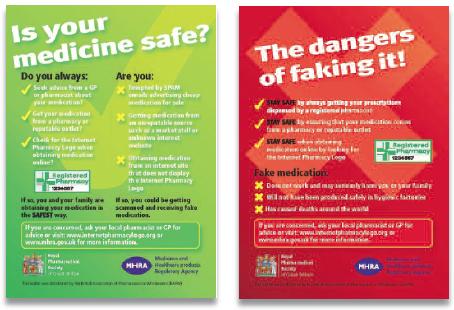Counterfeit medicines: what pharmacists should know
How pharmacists can prevent counterfeits reaching patients.
Article date: June 2009
Although the number of counterfeit medicines and medical devices entering the legitimate supply chain in the UK is small, pharmacists have an important role in helping prevent counterfeits reaching patients.
On 10 occasions since 2004 we have recalled batches of medicines where counterfeits are likely to have reached patients through the legitimate supply chain, the last of which was in May 2009. On 3 other occasions in the past 2 years, counterfeit medical devices have been identified as being sold to UK consumers. Counterfeit medicines and medical devices are a health risk to patients because they are not subject to the rigorous quality standards required of legitimate manufacture.
See risk of counterfeit insulin pen needles.
See also class 2 drug alert (action within 48 hours): Allen and Hanburys - Seretide 250 Evohaler (25 micrograms of salmeterol xinafoate and 250 micrograms of fluticasone propionate per actuation) - EL (09)A/12 for a drug alert for Seretide 250 Evohaler due to possible presence of counterfeit inhalers in the supply chain (May 12, 2009).
In recent years there has been an explosion of websites offering medicines for sale online, which has sparked much debate. The risk of obtaining substandard or counterfeit medication substantially increases when prescription-only products are purchased from unauthorised sources.
We are urging key stakeholders to assist in tackling these issues. Initiatives under way include awareness and providing 24-hour reporting hotlines.
Postcard guidance for patients
As part of a long-term public awareness campaign about counterfeit medication and its dangers, the MHRA and the Royal Pharmaceutical Society of Great Britain (RPSGB) have produced new guidance for patients, which is being issued through pharmacies. The pilot project (launched May 2009) involves every pharmacy in Great Britain distributing 50 copies of the guidance leaflets in patients’ prescription bags.
The guidance has been developed in conjunction with patient groups. The postcard-size leaflet offers practical advice about the safest way to purchase medicines as well as explaining what counterfeit medications are, how to minimise the risk of buying them, and what to do if patients suspect that they have been sold or supplied counterfeits. It particularly focuses on the increased risks involved with obtaining medication online (see leaflet images).
Campaigns
We also collaborated with Pfizer and patient groups earlier this year to produce a hard-hitting cinema campaign designed to shock people into discussion about the dangers of obtaining medicine online. The footage shows a man regurgitating a rat (to reflect a previous discovery of rat poison in a fake medicine) after taking a pill ordered online.
Future MHRA campaigns will target consumers who may be at particular risk such as online shoppers, men’s health forums, slimming clubs, and smoking-cessation bodies.
See the cinema campaign online
Professional guidance
The new patient postcard complements updated guidance for pharmacists and dispensing doctors on counterfeit medicines that was published in February 2009 through collaboration between the MHRA, RPSGB, and Dispensing Doctors’ Association.
See .
This pharmacist guidance explains the background to the production and supply of counterfeit medicines, and offers advice on steps pharmacists should take if they encounter a suspected counterfeit medicine. These steps include reporting suspected illegal websites to the MHRA to help safeguard public health.
Similar guidance is being developed for doctors and nurses in association with the General Medical Council, British Medical Association, and Royal College of Nursing.
If a patient is concerned that they have a counterfeit medicine, then the pharmacist or dispensing doctor should make a record (noting if possible the patient’s contact details, reason for the suspicion, product name, dose, batch number, and expiry date). They should then inform the MHRA immediately: email counterfeits@mhra.gsi.gov.uk; call 020 3080 6701 (24 hours); or report online at www.mhra.gov.uk/yellowcard
Healthcare professionals and the wider public can report suspected side-effects from a medicine that they suspect to be fake by completing a Yellow Card.
Online pharmacies
The internet provides counterfeiters with easy access to consumers and markets. A recent GP newspaper survey has found that one in four GPs has treated patients for adverse reactions to medicines bought online. The RPSGB has developed an internet pharmacy logo to help the public identify a bona fide website that is operated by a registered pharmacy in Britain.

Image of Registered Pharmacy logo.
Further discussions between the MHRA and General Medical Council will look at ways to tighten current legislation and systems for the online supply of medicines. A particular focus will be online consultations, which have potential to be misused by patients who are unsuitable for a particular treatment, or by unscrupulous organisations that sell medicines without the involvement of a healthcare professional.

Image of postcard-sized patient information leaflets.
More information:
Risks of buying medicines over the internet
Counterfeit medicines and devices
Royal Pharmaceutical Society of Great Britain
Dispensing Doctors’ Association
Article citation: Drug Safety Update June 2009, vol 2 issue 11: 9.